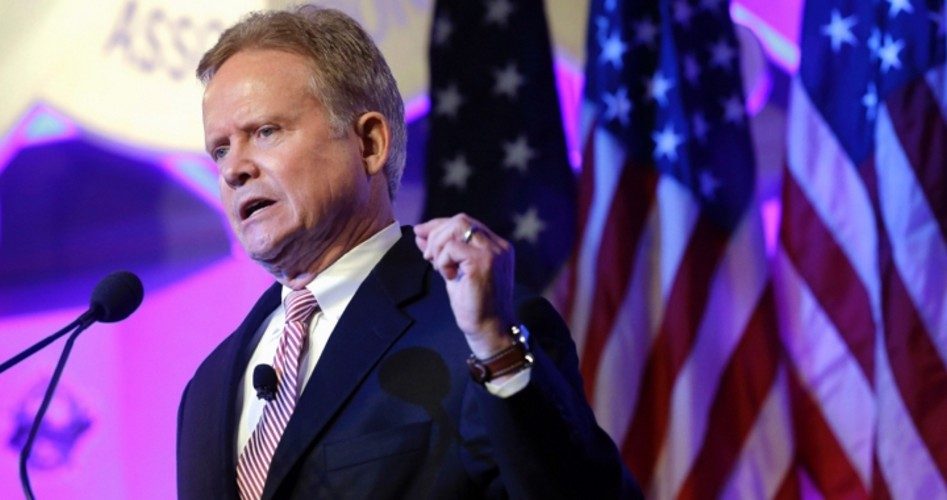
While many conservatives have been quite happy with much of President Donald Trump’s policies, his choice of personnel to staff his administration has been, in a word, unsatisfying. But if the rumors that former Senator Jim Webb (D-Va.) may be picked to replace Jim Mattis as secretary of defense are true, it appears that many conservatives of the noninterventionist bent will be quite happy.
Among those who have weighed in to support Webb include Mollie Hemingway of The Federalist, Laura Ingraham of Fox News, Bill Kauffman of The American Conservative, and Jim Hanson of the Security Studies Group. Hanson noted, “Jim Webb would be a smart choice.… He is also a Democrat — maybe the last actual conservative Democrat in public life — and believes in a strong military, used only when the need is unmistakable and the mission is crystal clear.”
Hemingway has advocated for Webb since Trump was elected in 2016, writing in Webb’s support, “One sector of [Trump’s] coalition is the one that includes those who were attracted to what they believed his foreign policy to be — restraint about when and where the United States fights wars coupled with a clear path to victory when we do.”
It is also noteworthy that Webb’s son works for Senator Rand Paul, one of the most noted noninterventionist members of Congress.
Why would these Republican voices be so excited about a former Democrat U.S. senator taking the reins at the Department of Defense?
A look at Webb’s life and career, along with his own words, perhaps will provide the answer. He graduated from the U.S. Naval Academy in 1968 and served as a Marine in Vietnam, where he was awarded the Navy Cross for heroism and two Purple Hearts. His war wounds — shrapnel in his knee, kidney, and head — forced his retirement from the Navy. Later, President Ronald Reagan made Webb secretary of the Navy, though Webb later resigned in 1988 after refusing to reduce the size of the Navy.
Webb is also an accomplished writer, having written six novels between 1978 and 2002. His 2004 non-fiction book Born Fighting: How the Scots-Irish Shaped America was the basis of a TV documentary on the Smithsonian channel. Webb has also turned his pen to opposing American overseas military adventures. In 1990, he wrote in the New York Times in opposition to President George H.W. Bush’s military intervention in Iraq. He demanded that Bush first get consent from Congress, and warned against a permanent military presence in the Middle East. Later, Webb wrote in the Washington Post in opposition to President George W. Bush’s expected invasion of Iraq in 2003.
In the Post article, Webb argued that the overthrow of Saddam Hussein would not “actually increase our ability to win the war against international terrorism.” In an interesting note, he said that military success could be measured as much by preventing wars as in actually fighting them. He decried that the Bush administration had “no exit strategy if we invade.” After the invasion, Webb wrote for USA Today that Bush had “committed the greatest strategic blunder in modern memory.”
But Webb is no anti-war leftist who accuses American soldiers of war crimes. He criticized Bush’s 2004 Democratic opponent, John Kerry, for the incendiary remarks he made about American soldiers in his infamous 1970s testimony to Congress, representing Vietnam Veterans Against the War. Kerry even compared their actions in Vietnam to Genghis Khan’s atrocities, such as cutting off heads and other body parts.
Webb appears to be no friend of the globalists — his name does not appear in the membership list of the Council on Foreign Relations (CFR) — and in 2006, he wrote yet another op-ed that should encourage Americans who favor national sovereignty. In the Wall Street Journal, Webb wrote a piece entitled “Class Struggle: American workers have a chance to be heard” condemning elitist policies that he believed had hurt American workers. The article decried the “age of globalization and outsourcing, and with a vast underground labor pool from illegal immigration.” He specifically cited what he considered the damaging effects of the elitists’ free trade agenda and globalization.
While not an issue that is likely to be addressed by a secretary of defense, Webb has also been a vocal supporter of the Second Amendment, noting, “I have had a permit to carry a weapon in Virginia for a long time; I believe that it’s important; it’s important to me personally and to a lot of the people in the situation that I’m in to be able to defend myself and my family.”
Webb has been both a Republican and a Democrat, but he has consistently insisted that presidents of either party cannot take military action without approval from Congress. In 2016 he offered criticism of the foreign policy of both George Bush and Barack Obama, asking: “How could one Republican presidential administration have made such an incredible strategic blunder as the invasion and occupation of Iraq, only to see the next Democratic administration make an equally strategic blunder — at least as bad, and possibly worse — by initiating what was called ‘the Arab Spring?’”
Of course, there are no guarantees that Jim Webb would be a good secretary of defense, as no one knows what an office-holder will actually do once in office. But when one looks at the list of the others under consideration for the post — Tom Cotton of Arkansas, Lindsey Graham of South Carolina, and even former CIA Director David Petraeus — it’s difficult to see how Webb could be worse.
Photo: AP Images



